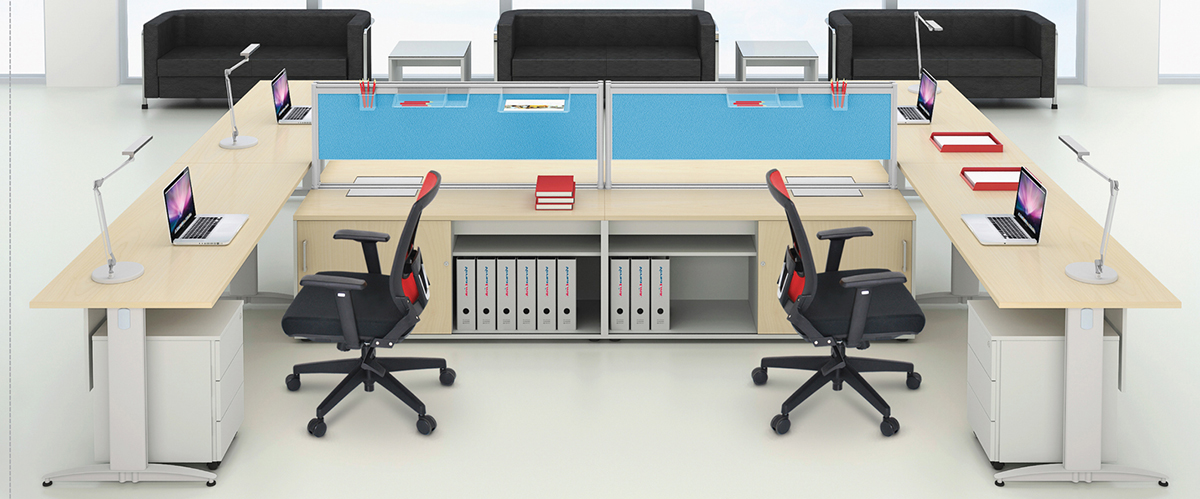The Psychology of Office Furniture: How Design Influences Employee Morale and Performance
The importance of office furniture in shaping employee morale and performance cannot be overstated.
Office furniture is not just about aesthetics and functionality; it plays a pivotal role in influencing the
psychological well-being of employees.

This blog explores the psychology behind office furniture design and how it can influence the well-being
and productivity of employees.
1. Comfort Equals Productivity
One of the primary factors in office furniture design is comfort. Comfortable chairs, ergonomic
desks, and supportive accessories can make a world of difference in an employee's day-to-day
experience. When employees are comfortable, they are less likely to experience discomfort or
distractions, allowing them to focus on their tasks more effectively. Ergonomically designed
furniture not only enhances physical comfort but also reduces the risk of workplace-related
injuries and chronic health issues, which can lead to increased absenteeism and decreased
productivity.
2. Aesthetics and Mood
The aesthetics of office furniture can have a profound impact on employee morale. A visually
appealing and well-designed workspace can boost morale by creating a more enjoyable and
inspiring atmosphere. Bright colours and modern, clean lines can evoke positive emotions and a
sense of creativity, while natural materials like wood can create a warm and inviting
environment. Employees are more likely to feel engaged and motivated when they enjoy
spending time in a visually pleasing workspace.
3. Collaboration and Communication
The arrangement of office furniture can influence how employees interact and collaborate with
one another. Open-plan workspaces with shared desks or flexible seating arrangements can
encourage spontaneous interactions and communication, fostering a sense of community and
teamwork. On the other hand, private offices with traditional furniture can provide a sense of
focus and concentration when needed. The choice of furniture and its arrangement should align
with the company's goals for collaboration and communication.
4. Personalisation and Identity
Allowing employees to personalize their workspace with furniture that suits their individual
preferences and needs can enhance their sense of identity and ownership in the workplace.
Employees who have control over their furniture and workspace arrangements are more likely to
feel a sense of belonging and satisfaction. This personalization can also improve their overall job
satisfaction, which can lead to increased morale and performance.
5. Flexibility and Adaptability
Office furniture that is easily adaptable to different tasks and work styles can support the
dynamic needs of a modern workforce. Modular furniture, adjustable standing desks, and
movable partitions allow employees to customize their workspace based on their tasks and
preferences. This adaptability can improve employee morale by providing them with the tools
they need to work efficiently and comfortably.
The Importance of Office Furniture in Employee Morale and
Performance
● Comfort Enhances Productivity
Employees who spend long hours at their desks need supportive chairs and ergonomic desks.
Furniture that prioritizes comfort reduces physical discomfort, preventing distractions and
discomfort that can hinder productivity.
● Aesthetic Appeal Uplifts Morale
The aesthetics of office furniture can significantly influence how employees feel in their
workspace. A visually pleasing and well-designed office space can evoke positive emotions,
motivation, and a sense of pride in one's work environment. Bright colours, modern design, and
clean lines can enhance the overall mood.
● Personalization Fosters Ownership
Allowing employees to personalize their workspace with their choice of furniture can foster a
sense of ownership and identity. When employees have control over their furniture and
workspace arrangements, they are more likely to feel connected to their workspace, which can
boost morale.
Also Read | Designing a Functional and Aesthetic Workspace: Tips for Choosing the Right Piece
Impact of Home Office Furniture on Remote Work Morale and
Performance
● Creating a Productive Home Office
With the rise of remote work, home office furniture has gained prominence. The design of home
Office furniture can significantly impact remote workers' morale and productivity. Ergonomic
chairs and adjustable desks can help remote employees create a comfortable and efficient
workspace at home, mirroring the comfort and functionality they would find in a traditional
office.
● Separation of Work and Personal Life
Appropriate home office furniture can help remote workers establish a clear boundary between
work and personal life. This separation is essential for maintaining mental well-being and morale.
A designated workspace with comfortable furniture can signal the start and end of the workday.
Conclusion
Office furniture is more than just a functional necessity; it has a profound impact on the psychology and
well-being of employees. Comfortable and aesthetically pleasing furniture enhances morale and
productivity in traditional offices, while the right home office furniture is essential for remote workers.
Moreover, the ability to personalize workspaces and adapt to changing needs plays a vital role in job
satisfaction. Understanding the psychology of office furniture design is essential for creating a workspace
that fosters happy, engaged, and productive employees, whether they work in the office or remotely.
- 09.04.2023